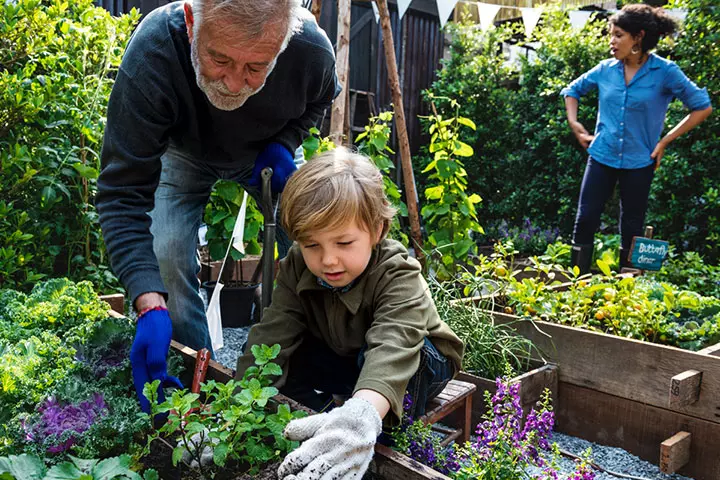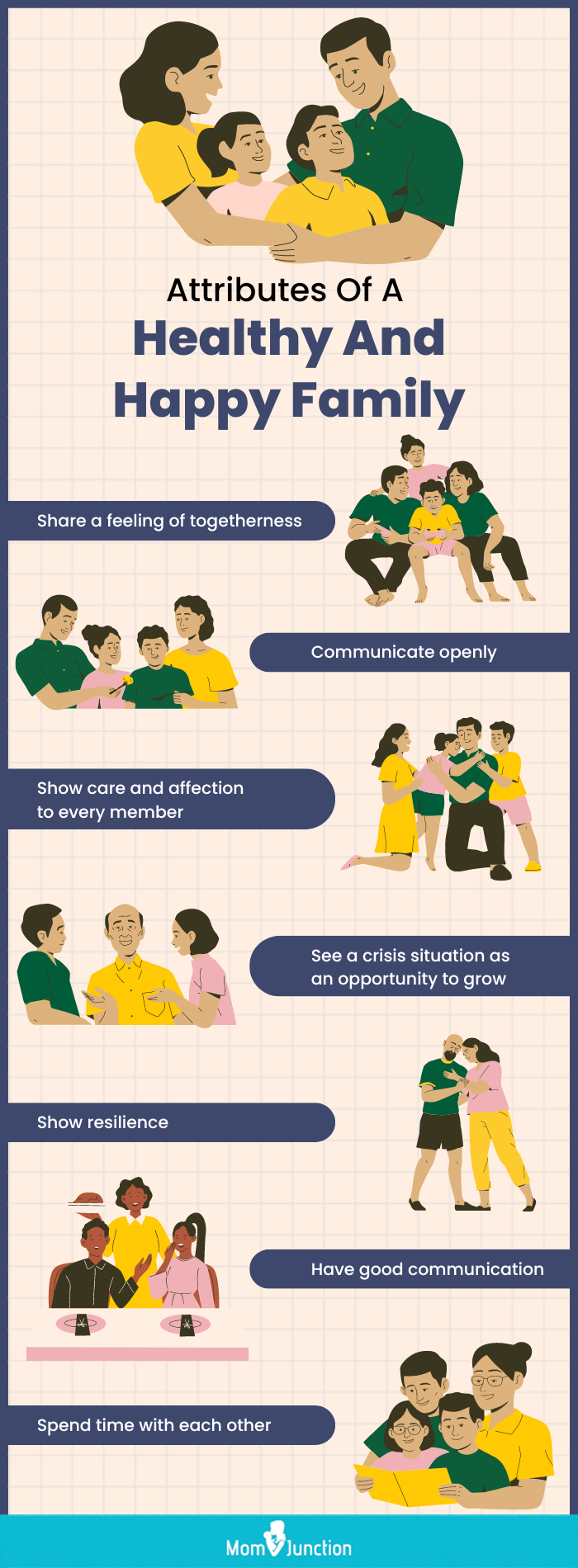
Image: ShutterStock
Life is much easier when you have a supportive family that sticks with you through thick and thin. Family relationships are important for a person at every stage of life. When life gets hard and starts to grip away from your control, the kind words of your mother, spouse, or siblings calm your soul and give you the strength and courage to take on life head-on. You need your family for emotional support and enrichment, personal growth, and overall well-being. Understanding the dynamics of family relationships can help you become a more rounded individual and build stronger bonds. Read on as we talk about the importance of family, its characteristics, and ways to build a strong relationship with family members.

Key Pointers
- Our mental development and overall happiness are shaped by family relationships.
- A strong family is characterized by feelings of safety, acceptance, love, and effective communication.
- Building strong family relationships requires spending quality time together, practicing good communication, showing appreciation, and having resilience.
- To strengthen family relationships, members should communicate and listen actively to each other, be approachable, and acknowledge each other’s contributions.
What Constitutes A Family?

A family constitutes people who may be related through common genealogy and share an emotional bond and similar values. Family members can be related by birth, marriage, adoption, or foster care.
Your immediate family includes parents, siblings, spouse, and children. And your extended family includes people you are related to, such as grandparents, cousins, aunts & uncles, nephews, nieces, in-laws, stepfamily, etc.
Families are of different sizes — nuclear (a couple and their children), joint (a couple, their children, grandchildren), blended (a couple, their children, and children from their previous marriages), etc.
Why Are Family Relationships Important?

A family is important because our mental growth, well-being, and stability all depend on our family.
- A family makes all its members feel safe and connected to one another.
- It provides us with the comfort of having people by our side during tough times, helping us to manage our stress.
- A family allows us to feel safe, protected, accepted and loved despite our shortcomings.
- Families are the basic units that teach children about relationships. Children brought up in a healthy family will be able to form better bonds outside their home.
- Strong relationships teach us how to build trust in others as family members share both good and bad times together.
- Conflicts in family teach children a respectful way to resolve problems in the future. By mastering the art of conflict resolution, children are confident in facing similar issues later on.
- A strong family is all a person needs to become confident in life.
Common Challenges In Family Relationships
Family relationships are not all roses. Differing points of view, miscommunication, and other stressors can affect family relationships. Here are some challenges that families face.
- Parental relationship conflicts: When parents constantly fight and disagree, it can strain their relationship with each other and their children.
- Financial problems: When one or more earning members lose their jobs or the family faces debt issues, the stress resulting from it can negatively affect family relationships.
- Health-related issues: Families where one or more members are gravely ill or disabled can break apart due to stress, caregiving problems, and financial problems.
- Toxic behavior: Some family members can become manipulative, narcissistic, or controlling, which can make living with them difficult and even dangerous.
- Unresolved trauma: When pain or trauma resulting from a disaster or tragic event goes unaddressed, people can develop stress responses, which can alienate them from their families.
- Unhealthy aspirations: When parents set impossible standards for their children or spouses have unrealistic expectations from each other, it can build negative emotions.
- Poor communication: Poor communication resulting from generational gaps or lack of honesty and openness can break apart many familial relationships.
- Lack of quality time: Lack of family time can break their relationships, as they cannot understand each other’s perspectives.
What Are The Characteristics Of A Strong Family?

According to research, an overwhelming 56.8% of adolescents perceive their familial bonds to be of good quality, with a striking 34.6% deeming them excellent.

Parental Relationship As A Major Factor In Adolescent Wellbeing
Source: Relevant Factors in Adolescent Well-Being: Family and Parental RelationshipsEach family is different. But all strong families have some common features. A few of them are listed below:
- Have good communication. A healthy family talks and listens to every member. It encourages adults and children alike to have a say in the decision making, share their opinions, or talk about their expectations and disappointments. Reflecting on the acquired life lessons and the strong family foundation laid by his parents, Joshua Becker, creator of the blog Becoming Minimalist, shares, “Both my mom and dad excel in the gift of conversation. They use both their ears and their mouth during communication. And evenings spent in the living room talking about life pass too quickly (i).”
- Share a feeling of togetherness. The members of the family share common beliefs and, therefore, feel connected to each other. This sense of similarity yields psychological affirmation and one has the satisfaction of being together with like-minded people.
- Spend time with each other. They make sure to have at least one meal together every day. They enjoy playing, camping, dining out or simply discussing politics. They actively involve themselves in each other’s lives but know where to draw a line. It develops their compatibility and creates a strong bond.
Becker adds, “I distinctly remember my dad coming home from work each day for lunch―usually for a hot dog on bread with chips. Let me repeat: I always remember my dad coming home from work for lunch.
“My dad worked hard. But when he would come home, he would get on the floor and play with his kids.”
- Show care and affection to every member. The members have kind words to say to each other. They accept you unconditionally but guide you on to the right path if you are deviating. With their care, affection, and friendship, they make you feel belonged.
- Lead by example. The elders follow what they teach the younger members of the family. The value system is set up by example.
- Support its members. The world might be against you, but your family is with you. It supports you in your fight, and lets you know they are with you in your decisions. A well-knit family does not discriminate between family members and responds to everybody’s needs.
- See a crisis situation as an opportunity to grow. They strive to see something positive in all circumstances, helping you to cope with adverse situations without getting overwhelmed.
- Focus on every member’s well-being. The family members work as a team to protect and provide for each other. Only the feeling of mutual love can motivate people into compromising on their comforts for the happiness of their family.
- Show resilience. Every family goes through ups and downs in their lives and share painful experiences together. But no distressing experiences loosen the bond they share. The virtue of loyalty comes from a family.
Remember that all these virtues of a strong family do not come overnight. You need to work together for years to build a healthy family.
How To Build Strong Family Relationships?
If you are wondering about how to create family bonding, here are some ways to build strong family connections.
1. Spend quality time

Set aside some time (maybe meal times) every day as family time, when you can talk about things and laugh together.
- Share family stories or ask everyday simple things to encourage conversation, such as “Hey, what did you do today in the school?”, “How are you finding your new Math teacher?”
- Set aside one-on-one chat time for everyone in the family to foster your bond. It can merely be five minutes before going to bed, but this can bring every member close to one another.
- Set some time apart exclusively for your partner to show your commitment.
 Quick tip
Quick tip2. Maintain good communication with everyone in the family
When your children or spouse want to talk, respect their needs and listen to them with attention. Give them enough time to express themselves properly.
- Be approachable to talk about difficult things. Talking about feelings like anger or frustration or delicate issues should be welcomed instead of shunning them. Talking about them doesn’t mean you are encouraging them but are helping solve the problem. Also be welcoming even for uncomfortable conversations. Through kindness and intimacy, people build trust that they can go to family with any issue.
- Be ready for a spontaneous conversation with kids. They often talk about their feelings before going to bed or in the shower. Listen to them.
- Be prepared to talk about matters of concern, especially with teenagers. Families find it difficult to discuss sex, alcohol, drugs or finances with the younger members. However, it is through a conversation that you can address such matters.
- Encourage non-verbal conversation through simple gestures like a warm kiss on the forehead every night before your children go to bed. It can relay your love to them.
- Try to have fun family rituals and traditions, such as movie nights or game nights, to increase the sense of belongingness.
3. Appreciate everyone in the family
Appreciate every member for performing their duties well. For example, praising and thanking a teenager for taking care of a younger sibling will make them feel important. These values can also be inculcated in your partnership with your close acquaintances. Acknowledging the efforts means that you respect their attitude.
4. Acknowledge and celebrate each other’s talents, differences, and strengths
A good family always cherishes the uniqueness of each of its members and acknowledges their abilities and strengths. At the same time, they help each other correct their shortcomings.
5. Stay focused on the current problem
Do not bring up previous issues every time you have to address a problem. In that way, you can avoid unpleasantness and instead, focus on the issue at hand.
6. Work like a team

When your family works as a team, every member feels acknowledged for their contribution. Share household chores. Allow little children to participate in chores like picking up their toys or putting their shoes back.
7. Establish clear family rules
Make family rules that clearly mention how every member should behave and treat each other. For example, “We talk respectfully with everyone in our family,” or “In our family, we help each other no matter what.” Such small but clear rules can make the family stronger and peaceful.
8. Teach children to forgive and make amends
Healthy families teach its members how to apologize, and forgive others when someone makes a mistake rather than harboring anger and jealousy. It teaches children to take responsibility for their actions. Try to have fun family rituals, which are special to your family, to increase the sense of belongingness.
Frequently Asked Questions
1. What is a family relationship in simple words?
A family relationship involves interaction between all the members. It typically includes living under one roof, communicating, taking care of each other, dealing with challenges, carrying forward family traditions, and giving each member a sense of belonging.
2. What makes a good family relationship?
Just like any relationship, a family relationship also requires constant nurturing. A good family relationship is possible only by prompt and effective communication, spending time with family, protecting and caring for each other, and providing emotional and other support.
3. What are the examples of a family relationship?
Family relationships include various kinships in a larger family setup. Examples of family relationships are husbands and wives, parent-child relationship, in-laws, and family of spouses, to name a few.
The first relationship that you establish after birth is with your family. When life seems challenging, your family plays a role in supporting you. Good communication, a feeling of togetherness, and constant support are common features of an affectionate family. To establish a stronger bond with your family, spend quality time with them, appreciate their efforts, and work together. People living in loving families have better attitudes and richer values. However, creating such families is not easy. Every action has consequences, and you need to work on your relationship daily to grow it. For instance, infidelity is rewarded with breakups, while love is rewarded with loyalty.
Infographic: What Are The Characteristics Of A Strong Family?
Having the support of your family members through life’s ups and downs gives you the strength to face all kinds of situations and emerge stronger. The infographic below presents a list of characteristics that define a strong family. Please read and share it with your kith and kin. Illustration: Momjunction Design Team
Illustration: Family Relationship: Why Is It Important And How To Build It?

Image: Dall·E/MomJunction Design Team
Learn how to support healthy family relationships with tips and advice from our experts.
Personal Experience: Source
MomJunction articles include first-hand experiences to provide you with better insights through real-life narratives. Here are the sources of personal accounts referenced in this article.
i. 60 life lessons I learned from my parents;https://www.becomingminimalist.com/60-life-lessons-i-learned-from-my-parents/
Community Experiences
Join the conversation and become a part of our nurturing community! Share your stories, experiences, and insights to connect with fellow parents.
Read full bio of Dr. Sadhvi Mythili
Read full bio of Kalpana M
Read full bio of Shikha Thakur
Read full bio of Benidamika J Latam

















